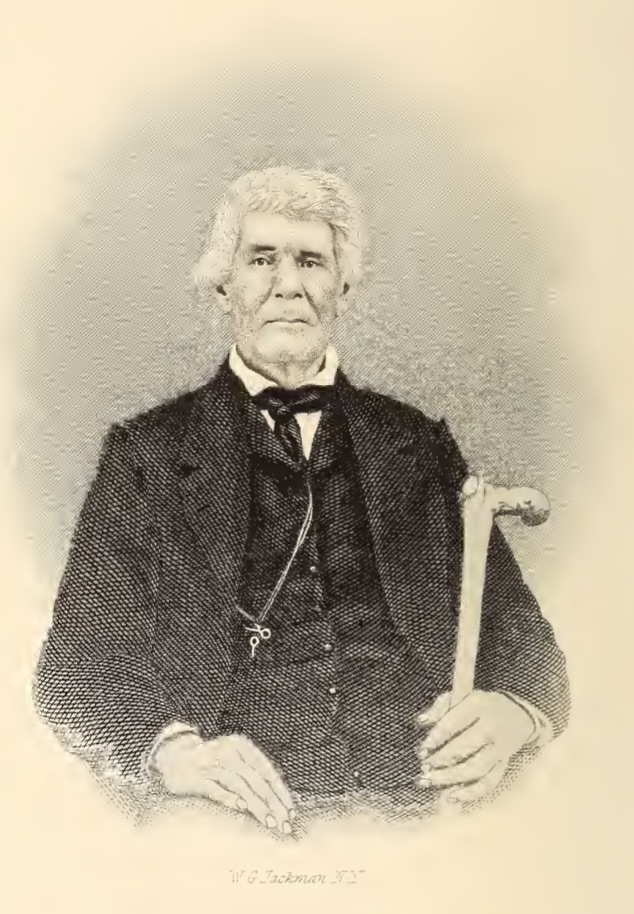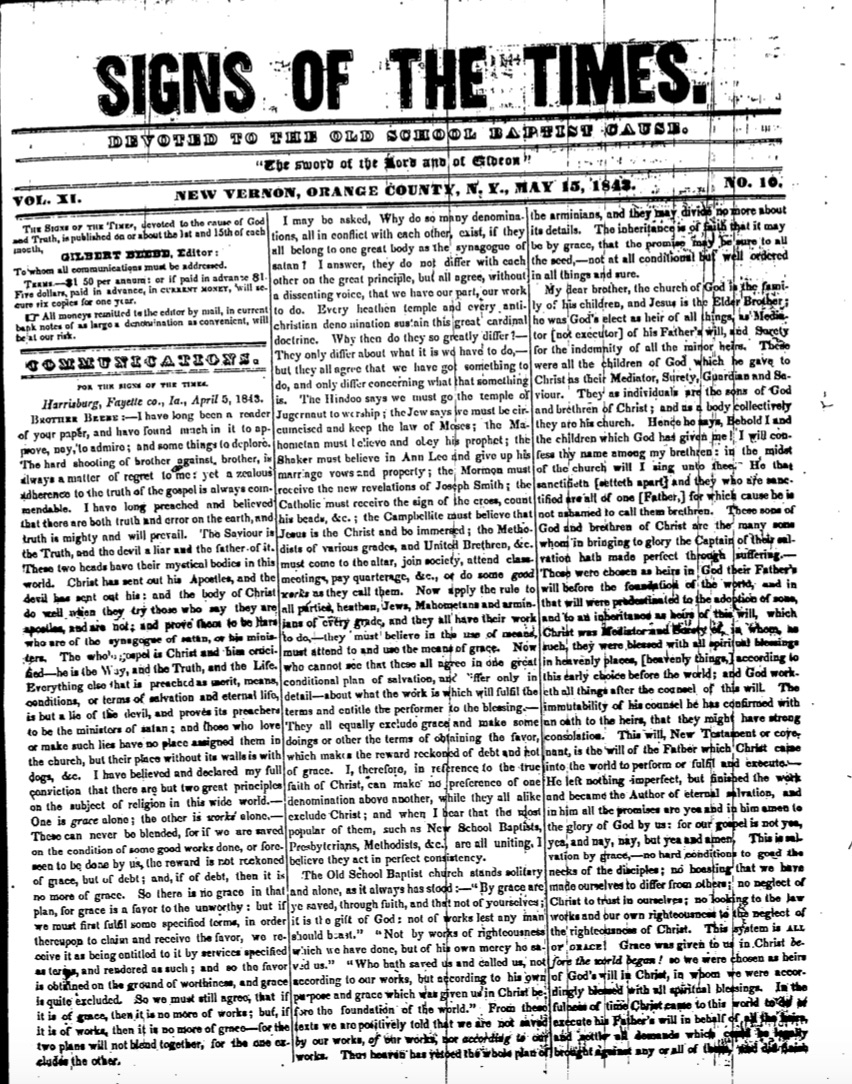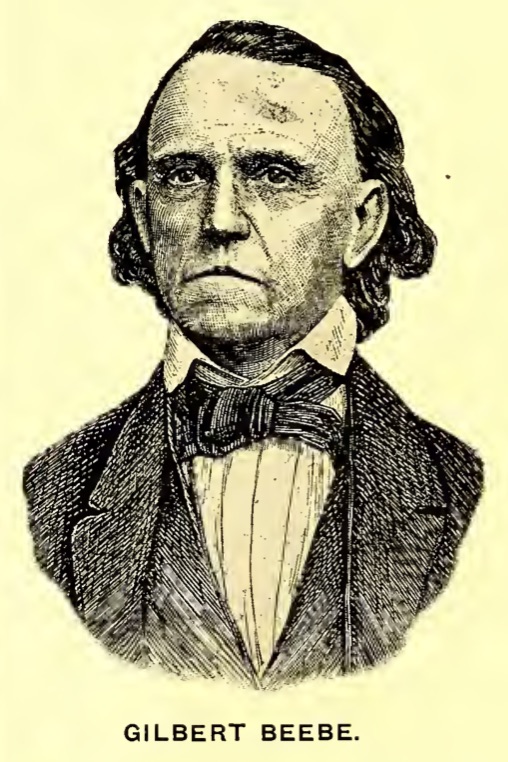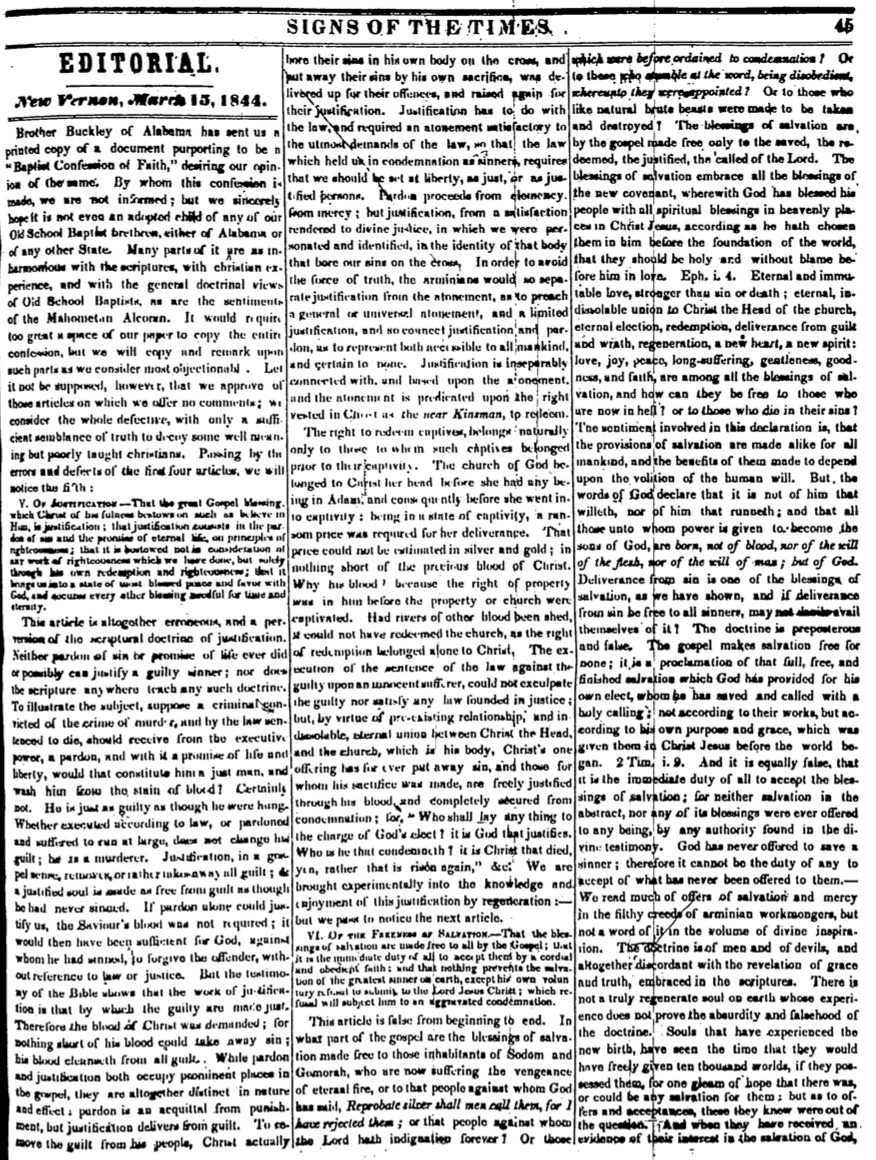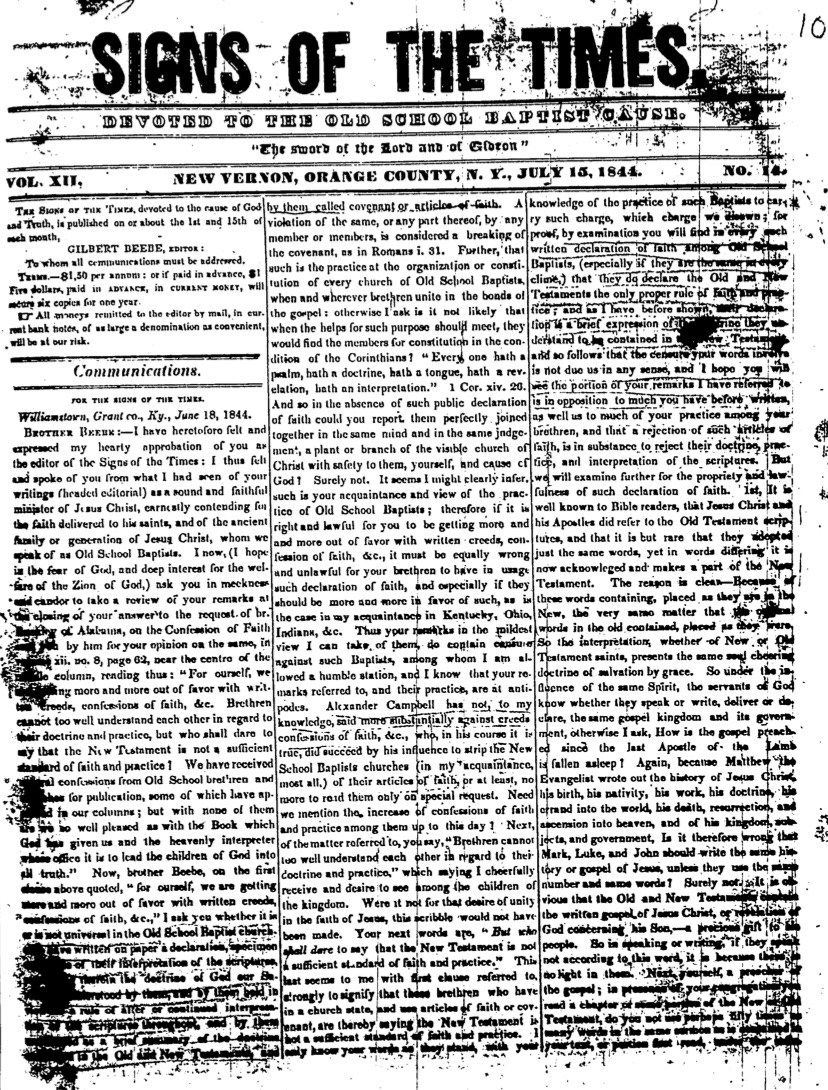Elder Wilson Thompson (1788-1866) has long been a respected name among Primitive Baptists of the United States. Elder Thompson was one of the earliest pioneer ministers to labor in the state (then territory) of Missouri and was extremely active in the earliest days of the struggle between Old School and New School Baptists. Despite early efforts which led him to extremes of expression regarding the essential doctrine of the nature and persons of the Godhead (see Triumph of Truth), Elder Thompson became a stabilizing influence over many in turbulent times, and continued with a passion for evangelism and ministry into his later years. He brought up a number of children, of whom Elder G. M. Thompson and Elder John Thompson became influential in their own right.
Highlighted in our post today is a letter published in the May 15 issue of The Signs of the Times of 1843. In this letter, Elder Thompson evidently seeks to extol the message of God’s free and Sovereign Grace, while furiously attacking the “means” gospel in every form. He admits no distinction between the reformed church, the Arminian churches, Roman Catholicism, and Islam. In Elder Thompson’s view, error is error, no matter the degree or nuance in the system. If it is not the Truth of Salvation by Grace, it is error and one error is just like any other. He is especially caustic in his statement:
“I, therefore, in reference to the true faith of Christ, can make no preference of one denomination above another, while they all alike exclude Christ; and when I hear that the most popular of them, such as New School Baptists, Presbyterians, Methodists, &c. are all uniting, I believe they act in perfect consistency.”
Having made his obligatory attack on the Missionary enterprise and all of the varied “means” systems of the day. Thompson then enters into, what in his mind must have been, a comprehensive explanation of the Truth. He deals with salvation as the will or testament of God the Father, administered through the mediation and suretyship of the Lord Jesus Christ.
Finally, he describes the work of God in bringing a spiritual revival to South Indiana calling out specifically the work of God at Lick Creek church where he served as pastor. For those who might have denied the possibility of conversions among the Old School Baptists, Thompson shares the following report:
“I have been leading willing subjects into the baptismal water, more or less, every month since last August, and they have all professed the faith. Different sister churches in several associations have been partakers in these blessings, and the cold and ice of the last winter have not prevented the young soldiers of Christ from being buried with him in baptism. This is no anxious seat revival; it is no missionary or arminian excitement, it is no noise and bustle, but solemn, deep, and of the Old School order; a rending of hearts and not of garments.”
Finally, returning to the antagonistic language so popular in the contentious times in which he lived, Thompson closes with this jewel:
“There are none of the freaks of nonsense among any of our churches and we hope there never may be.”
It is a great blessing to review the writings of our dear brethren who have passed this way before us. While I am thankful for their witness and for their faithfulness to stand in opposition to the popular trends of their society, culture, and even church relationships, I also want to learn from their mistakes, misdeeds. These brethren provide valuable examples both good and bad for us today. I will not be numbered with those who would cast of my heritage and deny the fellowship and association of these good brethren. Neither will I embrace their every word as a pattern for my preaching, writing, or action today. I will honor them by seeking to honor the Lord whom they professed to serve, and in striving to faithfully understand and apply His word in my own experience.
Elder Thompson closed his earthly pilgrimage with these words to his son from his deathbed (May 1, 1866):
“Well, it is all right; I am in the hands of a good and just God, in whom I have perfect faith. Nothing but a demonstration of His wonderful power can save my life.
My God knows no change. My faith is in Him, and living or dying, all is well.”
The entire text of Elder Thompson’s letter follows. Feel free to browse the photos of the original published version of the article as well as the surrounding content within The Signs of the Times-Volume XI.
Harrisburg, Fayette Co., Ia., April 5, 1843.
BROTHER BEEBE: – I have long been a reader of your paper, and have found much in it to approve, new, to admire; and some things to deplore. The hard shooting of brother against brother, is always a matter of regret to me: yet a zealous adherence to the truth of the gospel is always commendable. I have long preached and believed that there are both truth and error on the earth, and truth is mighty and will prevail. The Savior is the Truth, and the devil is a liar and the father of it. These two heads have their mystical bodies in this world. Christ has sent out his Apostles, and the devil has sent out his: and the body of Christ do well when they try those who say they are apostles, and are not; and prove them to be liars who are of the synagogue of satan, or his ministers. The whole gospel is Christ and him crucified— he is the Way, and the Truth, and the Life. Everything else that is preached as merit, means, conditions, or terms of salvation and eternal life, is but a lie of the devil, and proves its preachers to be the ministers of satan; and those who love or make such lies have no place assigned them in the church, but their place without its walls is with dogs, &c. I have believed and declared my full conviction that there are but two great principles on the subject of religion in this wide world. — One is grace alone; the other is works alone.— These can never be blended, for if we are saved on the condition of some good works done, or foreseen to be done by us, the reward is not reckoned of grace, but of debt; and, if of debt, then it is no more of grace. So there is no grace in that plan, for grace is a favor to the unworthy: but if we must first fulfill some specified terms, in order thereupon to claim and receive the favor, we receive it as being entitled to it by services specified as terms, and rendered as such; and so the favor is obtained on the ground of worthiness, and grace is quite excluded. So we must still agree, that if it is of grace, then it is no more of works; but if it is of works, then it is no more of grace—for the two plans will not be blend together, for the one excludes the other.
I may be asked, Why do so many denominations, all in conflict with each other, exist, if they all belong to one great body as the synagogue of satan? I answer, they do not differ with each other on the great principle, but all agree, without a dissenting voice, that we have our part, our work to do. Every heathen temple and every anti-christian denomination sustain this great cardinal doctrine. Why then do they so greatly differ?—They only differ about what it is we have to do,— but they all agree that we have got something to do, and only differ concerning what that something is. The Hindoo says we must go to the temple of Jugernaut to worship; the Jew says we must be circumcised and keep the law of Moses; the Mahometan must believe and obey his prophet; the Shaker must believe in Ann Lee and give up his marriage vows and property; the Mormon must receive the new revelations of Joseph Smith; the Catholic must receive the sign of the cross, count his blades, &c.; the Campbellite must believe that Jesus is the Christ and be immersed; the Methodists of various grades, and United Brethren, &c. must come to the altar, join society, attend class meetings, pay quarterage, &c., or do some good works as they call them. Now apply the rule to all parties, heathen, Jews, Mahometans and Arminians of every grade, and they all have their work to do,—they must believe in the use of means, must attend to and use the means of grace. Now who cannot see that these all agree in one great conditional plan of salvation, and differ only in detail—about what the work is which will fulfill the terms and entitle the performer to the blessing.—They all equally exclude grace and make some doings or other they terms of obtaining the favor, which makes the reward reckoned of debt and not of grace. I, therefore, in reference to the true faith of Christ, can make no preference of one denomination above another, while they all alike exclude Christ; and when I hear that the most popular of them, such as New School Baptists, Presbyterians, Methodists, &c. are all uniting, I believe they act in perfect consistency.
The Old School Baptist church stands solitary and alone, as it always has stood: — “By grace are ye saved, through faith, and that not of yourselves; it is the gift of God: not of works lest any man should boast.” “Not by works of righteousness which we have done, but of his own mercy he saved us.” “Who hath saved us and called us, not according to our works, but according to his own purpose and grace which was given us in Christ before the foundation of the world.” From these texts we are positively told that we are not saved by our works, of our works, nor according to our works. Thus heaven has vetoed the whole plan of the arminians, and they may divide no more about its details. The inheritance is of faith that it may be by grace, that the promise may be sure to all the seed,—not at all conditional but well ordered in all things and sure.
My dear brother, the church of God is the family of his children, and Jesus is the Elder Brother; he was God’s elect as heir of all things, as Mediator [not executor] of his Father’s will, and Surety for the indemnity of all the minor heirs. These were all the children of God which he gave to Christ as their Mediator, Surety, Guardian and Savior. They as individuals are the sons of God and brethren of Christ; and as a body collectively they are his church. Hence he says, Behold I and the children which God has given me! I will confess thy name among my brethren: in the midst of the church will I sing unto thee. He that sanctified [setteth apart] and they who are sanctified are all of one [Father,] for which cause he is not ashamed to call them brethren. These sons of God and brethren of Christ are the many sons whom in bring to glory the Captain of their salvation hath made perfect through suffering.—Those were chosen as heirs in God their Father’s will before the foundation of the world, and in that will were predestinated to the adoption of sons, and to an inheritance as heirs of this will, which christ was Mediator and Surety of, in whom, as such, they were blessed with all spiritual blessings in heavenly places, [heavenly things,] according to this early choice before the world; and God worketh all things after the counsel of this will. The immutability of his counsel he has confirmed with an oath to the heirs, that they might have strong consolation. This will, New Testament or covenant, is the will of the Father which Christ came into the world to perform or fulfil and execute.— He left nothing imperfect, but finished the work and became the Author of eternal salvation, and in him all the promises are yea and in him amen to the glory of God by us: for our gospel is not yea, yea, and nay, nay, but yea and amen. This is salvation by grace,—no hard conditions to goad the necks of the disciples; no boasting that we have made ourselves to differ from others; no neglect of Christ to trust in ourselves; not looking to the law of works and our own righteousness to the neglect of the righteousness of Christ. This system is ALL OF GRACE! Grace was given to us in Christ before the world began! so we were chosen as heirs of God’s will in Christ, in whom we were accordingly blessed with all spiritual blessings. In the fulness of time Christ came to this world to die to execute his Father’s will in behalf of all the heirs, and settle all demands which could be legally brought against any or all of them, and did finish all this work perfectly; and so by his one sacrifice he hath perfected forever them that were sanctified, [set apart as heirs in the will he came to execute,]—all this was grace,—For ye know the GRACE of our Lord Jesus Christ, that though he was rich yet for your sakes he became poor, that yet through his poverty might be made rich. So the work of conversion faith, peace, hope and joy is called great grace which was upon the churches. The gospel proclamation of Christ and him crucified, is called the grace of God that bringeth salvation to all men, [nations,] which hath appeared, teaching us [the heirs of all nations] the denying of ungodliness and worldly lusts, that we should live soberly, righteously, and godly in this present evil world. The renewed soul in this plan can never attribute any good in him, don by, or with he now anticipates or has heretofore enjoyed, to himself or his works; but is still bound to say, By the grace of God I am what I am. In all the trial of this state of pilgrimage and warfare, we can have no confidence in the flesh; but renouncing all hope in human aid, either our own or others we are sure that every heir will finally and certainly possess the full portion of his Father’s will; for that Father says, My grace is sufficient for thee. This grace is all suited to the unworthy—it says the lost—it sounds salvation to the helpless—strength to the weak—life to the dead—and eternal beauty and glory to the sin deformed and polluted. The Spirit of this grace has been displaying its quickening energies in a number of churches in this state during the last eight or ten months; large additions have been made to a number of the churches. The saints have been greatly refreshed. The ministers have been unusually active and arduous in their labors, and especially where the good work was going on. Their works has not been directed to frighten or convert souls: this is the Spirit’s work; but they have labored to teach the renewed mind, and hold out Christ and him crucified to them that were seeking for the good old way. I thank my God that my family and the Lick Creek church, with many around have copiously shared in this blessing.
I have been leading willing subjects into the baptismal water, more or less, every month since last August, and they have all professed the faith. Different sister churches in several associations have been partakers in these blessings, and the cold and ice of the last winter have not prevented the young soldiers of Christ from being buried with him in baptism. This is no anxious seat revival; it is no missionary or arminian excitement, it is no noise and bustle, but solemn, deep, and of the Old School order; a rending of hearts and not of garments. There are none of the freaks of nonsense among any of our churches and we hope there never may be.
Yours in the unity of the faith,
WILSON THOMPSON.

